 Nothing can quite express one's emotions like
music. Our innermost thoughts, our deepest darkest secrets can become a story,
a novel - a novel that is set to guitar strums, piano chords, pulsating bass
drums.
Nothing can quite express one's emotions like
music. Our innermost thoughts, our deepest darkest secrets can become a story,
a novel - a novel that is set to guitar strums, piano chords, pulsating bass
drums.
Music paints a picture of life. Based on environment, one musical style may more so speak to you than another. But, all speak life. It is the universal language human beings use to communicate with each other and, many times, their Creator.
Just as we use
the languages of Spanish, French or German to communicate concepts of love,
hurt, joy, tragedy and worship, we use music in the very same way.
Yet, somewhere along our way, we began to judge the instrument. Pun intended.
Urban Gospel music, which surprisingly has its own Wikipedia entry, is the genre on which most have cast that judgment. Its origins date back to the 1970s but it actually got its legs in the mid to late 1980s within the African-American community when acts like Stephen Wiley, T Bone, Gospel Gangstas (ex-Blood/ex-Crip members) and dcTalk began recording and performing their own Christian variety of rap music.
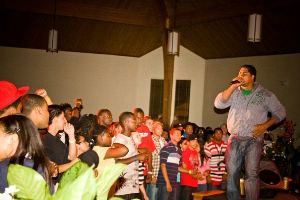 Urban, which
means "of the city," is used as an umbrella to represent the different genres
of music that derived from the inner city or the "streets." Yet, what was meant
for evil, God has used for good. Today, God-fearing artists are using this
urban music, made it their own, and have re-packaged it as Urban Gospel. After
all, the Gospel or the "Good News" of Jesus Christ is meant to bring happiness,
peace, and conviction of the Holy Spirit, no matter its packaging, right?
Urban, which
means "of the city," is used as an umbrella to represent the different genres
of music that derived from the inner city or the "streets." Yet, what was meant
for evil, God has used for good. Today, God-fearing artists are using this
urban music, made it their own, and have re-packaged it as Urban Gospel. After
all, the Gospel or the "Good News" of Jesus Christ is meant to bring happiness,
peace, and conviction of the Holy Spirit, no matter its packaging, right?
Then why have fans
and producers of the musical styles within the genre like Hip-hop, R&B, Reggae,
Soca and Latin styles (Reggaeton, Merengue and Salsa), received such opposition?
No. It's not from mainstream artists, labeling Urban Gospelites as copy cats.
It's from those who share their faith.
"I remember I was asked to create mixtapes for a Gospel AM radio station," said Edingston Jackson aka Mr. E, an Urban Gospel DJ and recording artist. "The ratings went up, but by the next day I was kicked off the air. It was because a caller said that the music I was playing sounded too much like the world."
Nevertheless, in
the past three decades, Urban Gospel Music has picked up incredible speed,
inspiring street communities around the world to re-brand their own street
sounds with the message of Christ.
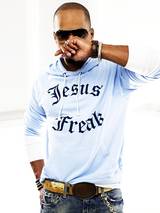 So meanwhile some
church traditionalists deem it to be 'too secular' or title it 'the devil's music,'
popular Urban Gospel artists like Kirk Franklin rise to #1 on the R&B
Albums chart, #3 on the Pop charts, and are certified multi-platinum.
So meanwhile some
church traditionalists deem it to be 'too secular' or title it 'the devil's music,'
popular Urban Gospel artists like Kirk Franklin rise to #1 on the R&B
Albums chart, #3 on the Pop charts, and are certified multi-platinum.
With numbers like that, can there not be some inherent value?
Mr. E, who is also the Chairman of Soul Movement Crew, an entertainment services group responsible for much of the development of the Urban Gospel scene in South Florida, is fed up with the genre's lack of support from within the church community.
"Gospel radio
stations put us on in the wee hours of the morning, church leaders call what we
do sinful," he said. "But, these same church leaders will scream, "Save the
young people. Save the young people at all costs...except by using urban gospel
music.""
After years of performing alongside and collaborating with some of the biggest names in Urban Gospel like Lecrae, Papa San, Nigel Lewis and Canton Jones, Mr. E has chosen to channel his frustrations in a way that celebrates the genre.
This summer, Soul Movement Crew, Oasis Church Miami, F-N-F Live and Vision Music team up to present Urban Gospel Fest, the first community festival in South Florida, solely dedicated to the unorthodox genre.
"You can't save the young people with "Amazing Grace," said Mr.E. "If you go deep sea fishing, you can't use a little piece of worm. You have to use bigger bait and bigger hooks and depending on the fish you want to catch, you have to use the bait they like. I don't know why the church doesn't get that."
Maybe because of where these styles find their roots.
REGGAE
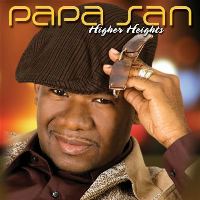 There is a
stereotype attached to people who sing reggae music. People envision a Black
man with dreadlocks, smoking "Mary Jane," holding a walking stick, and singing,
"Irie."
There is a
stereotype attached to people who sing reggae music. People envision a Black
man with dreadlocks, smoking "Mary Jane," holding a walking stick, and singing,
"Irie."
Reggae was birthed from an older style of Jamaican Music called 'ska,' which featured the sounds of horns and steel drums. When reggae music began in the late 1960s, it quickly became a worldwide phenomenon with the roots and culture music of Bob Marley.
Young artists like Papa San, regarded as one of the fastest-chatting reggae artists in the industry, started singing in the 1980s and brought a different sound to the table. It was called dancehall. However, in Jamaica, there was Christian music and then there was reggae music; and never the twain would meet.
"When I became a Christian in the year 1997, I was one of the first ones to launch out in the Gospel Reggae music industry and because of that I faced a lot of opposition," said Papa San, 43, now a Stellar award-winning Gospel Reggae artist.
"People would say
'Oh, I don't believe in reggae music being in the church because it's coming
from the secular world and so it cannot minister to me,'" said Papa San.
Today, he can only reply in a chuckle, revealing his thick Jamaican accent.
"Time will tell, and it has."
After seeing
thousands make decisions to know Christ at his concerts and seeing him become
the first Gospel Artist to hit the Reggae Billboard Charts three times, "people
actually believe now that I can use reggae as a vehicle to win souls," he said.
RAP
 Rap, the
music of Hip-hop culture, is a derivative of the reggae style called 'toasting.'
This lyrical way of talking over a record became popular in the United States
around the 1970s when DJ Kool Herc decided to use the style in New York City. It
then became prominent in the Black
community. Today, rap is the world's most popular genre of music because of contributions
made by larger-than-life icons such as Tupac, Biggie Smalls, Jay Z, Eminem,
etc...
Rap, the
music of Hip-hop culture, is a derivative of the reggae style called 'toasting.'
This lyrical way of talking over a record became popular in the United States
around the 1970s when DJ Kool Herc decided to use the style in New York City. It
then became prominent in the Black
community. Today, rap is the world's most popular genre of music because of contributions
made by larger-than-life icons such as Tupac, Biggie Smalls, Jay Z, Eminem,
etc...
Now, Gospel Rap artists such as Lecrae, Trip Lee, Flame, and Andy 'C-Lite' Mineo are using this style to their advantage to bring the "good news" to places where the gospel wouldn't normally be preached: the hoods, the garrisons and the barrios.
"People have
different approaches to music and gravitate to certain things. I loved Hip-hop as an art, but then I became
a Christian my freshman year of college," said Andy C-Lite Mineo, 23, who was
featured on the song "Background" by Lecrae, the only Gospel rapper to ever debut
in the Top 5 in sales as of this year. "It's not just a transition, it's life
changing."
Like reggae,
Hip-hop is opposed by many pastors and most traditional church-goers.
According to an
article written by Pastor G. Craige Lewis of Ex-Ministries, Hip-hop in and of
itself was originally used as an "outward expression of wrath and rebellion."
"We are not
coming against Christian rappers that rap the Gospel message of Jesus," said
Lewis. "But we are coming against those that stamp Jesus on the Hip Hop Culture."
Mineo understands Lewis' position, but still believes part of the culture can be reclaimed.
"I
actually love the culture, I don't like the sin within it that distorts its
beauty and dishonors God," said Mineo. "I use hip hop
music as a medium to reach the culture and those that have an ear to it."
R&B
 R&B,
which stands for Rhythm and Blues, began in the 1950s and today's variety
borrows influences from jazz, blues, and disco.
This genre was the most famous style of music during the 2nd
half of the 20th century and is credited as the inspiration for Rock
'N Roll. Since R&B is culturally an African American style of music, it is no
surprise that it also borrows influences from Gospel music - even though it is
considered a very secular genre to date.
R&B,
which stands for Rhythm and Blues, began in the 1950s and today's variety
borrows influences from jazz, blues, and disco.
This genre was the most famous style of music during the 2nd
half of the 20th century and is credited as the inspiration for Rock
'N Roll. Since R&B is culturally an African American style of music, it is no
surprise that it also borrows influences from Gospel music - even though it is
considered a very secular genre to date.
Marvin Winans, Jr., 31, is an original member of Winans Phase 2 and is a part of the famous Gospel music family, The Winans.
"I've had
questions posed to me based on the style of music. People would question
particular songs and what I meant and say that it sounds secular," said Marvin.
"I've heard people say that I'm trying to "be like the world" or "I'm trying to
make money" or "God is not my focus."
Nevertheless, his
most famous relatives, BeBe and CeCe Winans, paved the way for many Christian
singers by winning awards in 'cross-over R&B' and secular R&B markets, according
to Marvin.
However, Pastor Elaine Bookal, 41, of A Place Called Hope Church in Miami, Florida. warns that if the message becomes compromised, then there is a problem.
"[Artists] need to get into the depth of the Word of God instead of using one or two beats to catch the ear of people," said Bookal. "You cannot entertain unbelievers and not have conviction in the music. But, you can be creative and win souls."
SOCA
 Soca is a fusion of Indian rhythms and Calypso, an Afro-Caribbean style of music that originated in Trinidad and Tobago. Garfield Blackman of Trinidad
and Tobago is considered "The Father of Soca" and started it in the 1970s.
Soca is a fusion of Indian rhythms and Calypso, an Afro-Caribbean style of music that originated in Trinidad and Tobago. Garfield Blackman of Trinidad
and Tobago is considered "The Father of Soca" and started it in the 1970s.
A decade later, Blackman was quoted saying that Soca was being used to "celebrate the female bottom, rather than uplift the spirits of the people."
In essence, Soca music became the complete
opposite of what he intended.
Artists like Square One, Rupee and Allison Hinds made a name for Soca in The United States and internationally. But, while Soca King Nigel Lewis has a great stake in the development of Soca music, he has a story similar to that of dancehall legend Papa San.
Nigel
Lewis, who achieved the highest musical honor in Trinidad and Tobago by
becoming 1996 Road March King for the most played song - "Movin' To The Left" - on the road for
carnival, wowed Caribbean audiences a year later with his runaway hit "Follow The
Leader," which went gold.
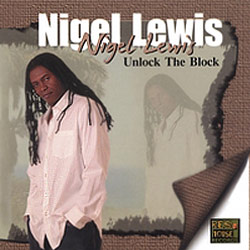
Now that he has committed his voice and music
to the cause of Christ, he intends to restore Soca music to its original purpose,
which is to "uplift the spirit of people."
While he may not make everyone happy by
redeeming a style of music closely tied to the "gyrating hips " dance called the whine, he hopes his twist
on Soca - incorporating the Word of God - will influence minds.
"Soca is really a happy form of music," Lewis said,
"This music is all about happiness and God is all about happiness. When you
start jammin' to this island music, you can't help but move your feet. You'll
leave with a smile on your face and food for thought."
SUGAR- COATED
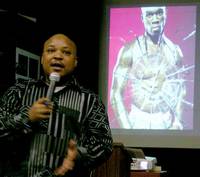 According
to pastors, church elders, and
overall opponents of the movement, the Urban and Contemporary Gospel genres have
been watered-down to appeal to a secular audience.
According
to pastors, church elders, and
overall opponents of the movement, the Urban and Contemporary Gospel genres have
been watered-down to appeal to a secular audience.
According to Christian website, A Toast 2
Wealth, Urban and Contemporary Gospel is called
"BubbleGum Gospel" or defined as a "new age Hip Pop-flavored music aspiring to be a part of the gospel industry but doesn't hit the mark."
They make assumptions that
these BubbleGum Gospel artists such as Tye Tribbett, Kirk Franklin and Mary
Mary may have "Illuminati ties." Illuminati is a secret conspiratorial organization
acting as a shadowy "power behind the throne," allegedly controlling
world affairs through present day governments and corporations, according to
Wikipedia.
Their skepticism is valid because just because a song refers to "God" once or twice in the chorus and bears the label "Gospel' does not mean that one can vouch for the spirit of the song, let alone the one behind it.
All in all,
Gospel Music is God's music. It is intended to be the 'Good News' and should be
treated as such.
Take a trip to the
Urban Gospel Fest on June 18, 2011. It will be held in the lot of Oasis Church Miami on 12905 NE 8th Ave. in North Miami. For information, please contact Soul Movement Crew at 786.443.3833 or visit Soul Movement Crew. See if there's
proof in the pudding.
While every genre
of music has a past, whether good or bad, they can all be reclaimed and used to
express God's love.
"Every big revolution in the world was paired with music of the day. That's our hope. To create change with the truth of our music," said Mr. E.

